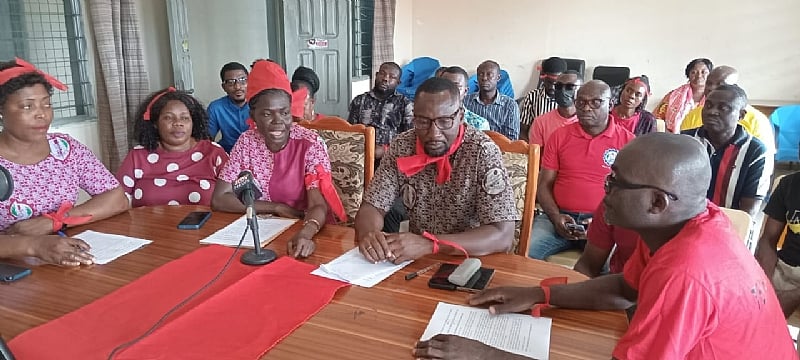The Teachers and Educational Workers Union (TEWU) of the Trades Union Congress (TUC) in Ghana’s Volta Region has initiated a nationwide strike, echoing the national directive, to protest against what they perceive as persistent and unjust discriminatory labor practices. This industrial action encompasses non-teaching staff within the Ghana Education Service (GES), junior staff in Public and Technical Universities, and employees of the Ghana Library Authority (GLA) and Ghana Museums and Monuments Board (GMMB). The core of their grievance lies in what they describe as systemic sidelining in welfare provisions, benefits, and conditions of service, despite their crucial roles in the educational system. This perceived marginalization, they argue, contravenes the principles of fairness and equity enshrined in the Labour Act (Act 651) and the 1992 Constitution. Unfulfilled promises and a protracted disregard for their concerns have fueled their frustration, leading to this decisive action.
At the heart of TEWU’s demands is the timely and full implementation of their Continuous Professional Development Allowance (CPDA). The union also seeks the resolution of outstanding issues regarding weekend and overtime allowances for security and catering personnel, as well as long-standing promotion grievances within the GES and Public and Technical Universities. These unresolved matters, they contend, represent a clear pattern of neglect and discrimination that undermines their professional dignity and economic well-being. The union firmly believes that their contributions to the educational sector warrant fair and equitable treatment, commensurate with their counterparts in teaching roles.
The strike action, according to TEWU, is not intended to inflict hardship on students or parents, but rather serves as a last resort to compel the government, through the Fair Wages and Salaries Commission, to address their legitimate grievances. The union maintains that they have exhausted all other avenues for dialogue and negotiation, and the strike is a necessary measure to bring attention to their plight and secure equitable treatment. They appeal to the public and all stakeholders to support their cause and urge the authorities to take swift action to resolve the impasse.
Madam Ruth Baidoo, the Regional Industrial Relations Officer of TEWU, highlighted the severity of the discrimination, stating that it has reached an unbearable level, necessitating immediate action. She pointed to the unresolved grievances of their members at the University of Health and Allied Sciences as a prime example of the systemic neglect. She further emphasized the ongoing injustice faced by GES members, who lack effective channels for redress. A particularly contentious issue is the disparity in CPDA payment. While their counterparts in teaching positions enjoy this benefit, TEWU members with equivalent qualifications are denied the same, creating a sense of inequity and resentment. This disparity, according to Madam Baidoo, further exacerbates the existing inequalities within the educational system.
The delay in upgrading TEWU members’ qualifications, even when eventually implemented, adds another layer of frustration. Madam Baidoo pointed out that the normalization process after an upgrade can take up to four or five years, further delaying the rightful benefits and recognition due to these employees. This protracted process, coupled with the lack of CPDA and other unresolved issues, contributes to a sense of demoralization and underscores the need for immediate intervention. The union insists that their members deserve the same opportunities for professional development and advancement as their teaching colleagues.
This strike action underscores a broader issue within the educational sector: the often-overlooked contributions of non-teaching staff. While teachers are rightfully recognized for their role in shaping young minds, the smooth functioning of educational institutions relies heavily on the support provided by administrative staff, security personnel, catering staff, and other essential workers. Their dedication and behind-the-scenes efforts contribute significantly to the overall learning environment. The TEWU strike serves as a reminder of the importance of recognizing and valuing the contributions of all stakeholders within the educational ecosystem. A fair and equitable system that acknowledges the vital role of non-teaching staff is essential for the continued success and growth of the education sector in Ghana. The union’s demands, therefore, represent not only a call for fair treatment but also a plea for a more inclusive and equitable educational system that values the contributions of all its members.














